
Before I delve into my personal issues with the characters and narrative of A Song Of Ice and Fire and its adaptation Game of Thrones, I thought it would be best to first explain why Game of Thrones got this popular to begin with and why millions of people found the show appealing. It's also important to bring this up because it explains how the show eventually went downhill.
Reason # 1 - Genre Deconstruction
One of the biggest reasons why Game of Thrones (and the books that it's based on) got so popular is because of it's successful ability to deconstruct many of the tropes that are commonly associated with the fantasy genre. What tropes did it actively seek out to subvert?
1) Plot Armor: One of the most frequently used terms in internet criticism when it comes to a fictional story is the term "plot armor." An easy definition of plot armor that I found on TV Tropes defines the term to mean this:
"Plot Armor is when a main character's life and health are safeguarded by the fact that he's the one person who can't be removed from the story. Therefore, whenever Bob is in a situation where he could be killed (or at the least very seriously injured), he comes out unharmed with no logical, In-Universe explanation."
In an earlier paragraph TV Tropes also mentioned another important aspect of plot armor:
"He [the main character] has the miraculous ability to evade death, serious wounds, and generally all lasting harm (until the plot calls for it). Even psychological damage can be held at bay by Bob's suit of Plot Armor."
https://tvtropes.org/pmwiki/pmwiki.php/Main/PlotArmor
So one of the main issues most people have with a lot of fictional stories is that you know beforehand that the main character is going to live no matter what danger actually befalls them.
How does this tie back to Game of Thrones? Well, it starts with a character named Ned.
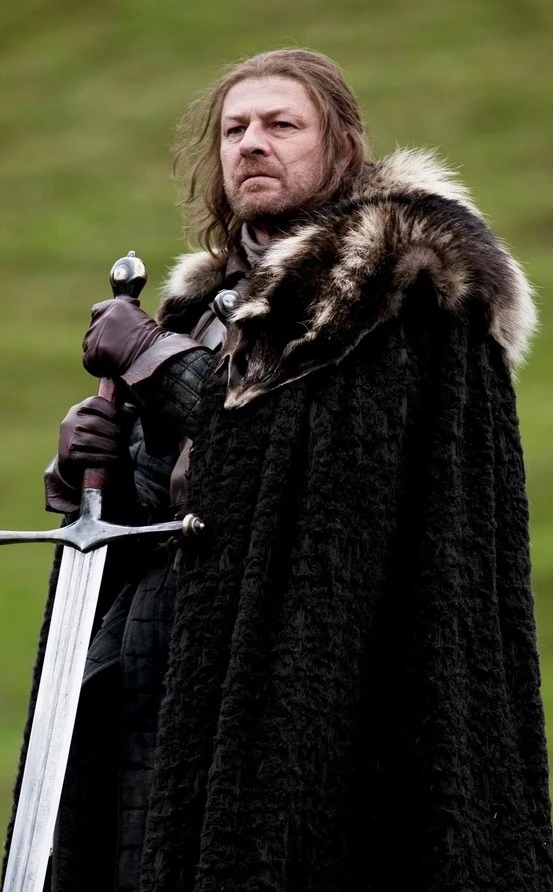
During the first season / book of the series we follow a man named Ned Stark. He was built up to be the main hero of the story. In the books he had the most Point-of-View chapters out of any characters in the story, he drove the events of the plot pretty well and he was an all around good guy. In any other narrative he would be the main character. Guess what happens to him.
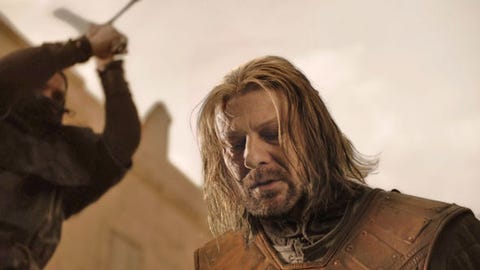
He gets his head chopped off at the end of the first season / show. This shocked a lot of people, myself included, because we all thought that he was going to live on throughout the series. But it doesn't stop there. After Ned Stark dies, a huge war kicks off called The War of the Five Kings. During this war Ned's oldest son, Robb Stark, declares war on the Lannisters in an effort to avenge the unjust death of his father.

"Okay, so maybe this is the type of story where the son rises up to avenge his father right? RIGHT?!"
Guess what happens to Robb Stark?

He gets betrayed, and his army gets massacred at his uncle's wedding. The slaughter of Robb Stark, and his army, is easily one of the most disturbing events that I have EVER WITNESSED IN A FICTIONAL STORY! This betrayal would eventually get called "The Red Wedding." The Red Wedding is up there with Chapter 5 of Fire Emblem 4: Genealogy of the Holy War. Yeah, that Chapter 5. That is just how disturbing and soul destroying watching "The Red Wedding" was. I will never not be able to unsee the Red Wedding.
So why am I telling you this? Well it's simple:
One of the main selling points of Game of Thrones is that anybody can die at any point in the story.
No character is too important that they can't get unceremoniously killed off when the plot needed them to die. Ned and Robb Stark were set up to be the heroes of the narrative, only to then get brutally cut down. Their deaths taught its readers/viewers an important lesson: No matter how much you love a certain character, no how important you may think they are, any character in the show can die at any moment.
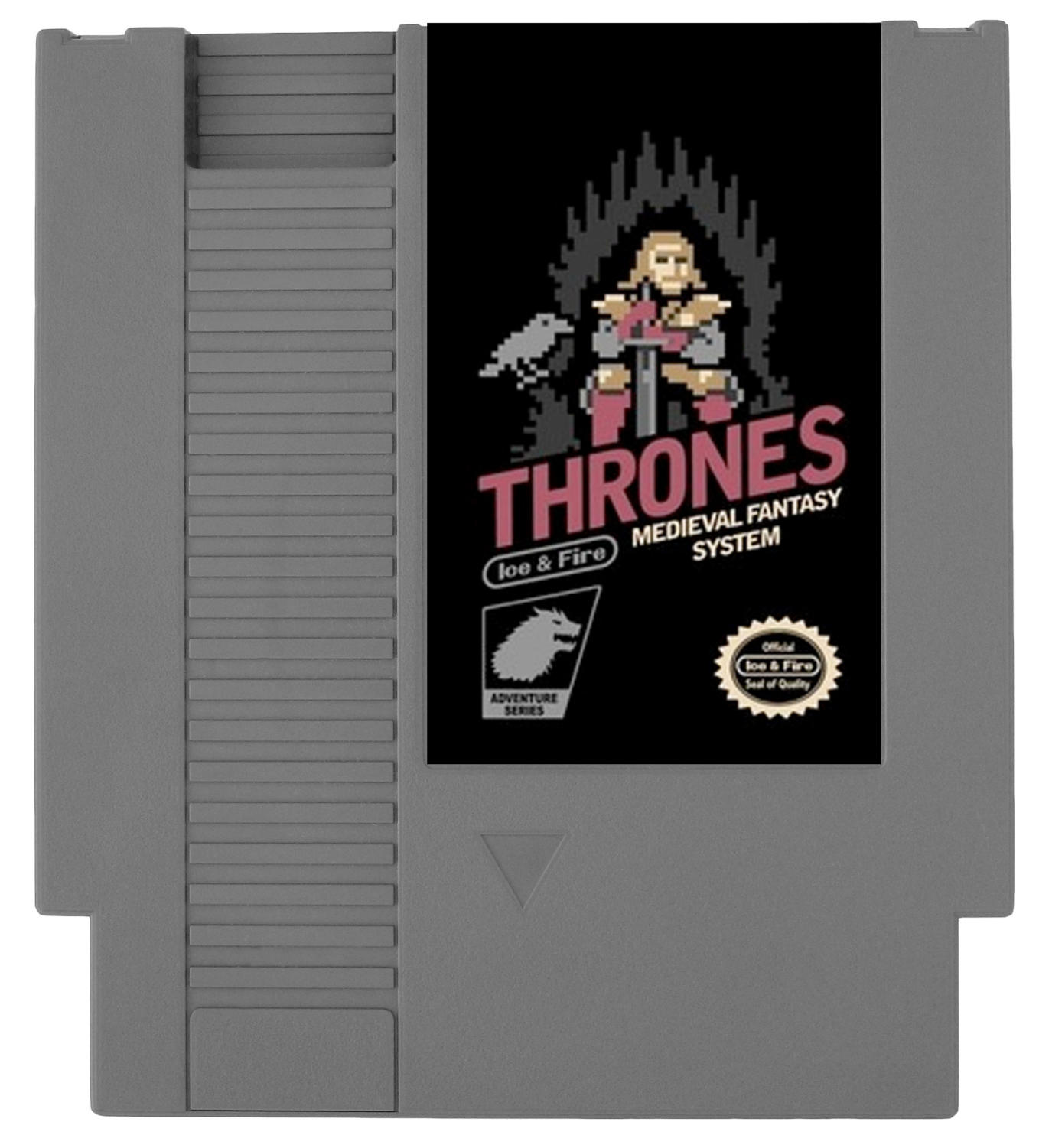
One more talking point I'd like to add is the idea that if a character makes a mistake, that character gets ruthlessly punished for said mistake. One storytelling trope that I see people hate on all the time is the idea that the main character is an idiot who never gets punished or faces any consequences for their idiotic behavior. Game of Thrones also set out to subvert this trope as well. The in universe explanation for why Ned and Robb Stark died is because they made some colossal tactical errors that got them killed.
And they're not the only ones who make huge mistakes. Game of Thrones is chock full of characters who make strategic miscalculations and screw ups all the time. And you can bet that they too get all sorts of grizzly and nasty punishments for their screw-ups.
______________________________________________________
2) Black and White Morality: Another major trope that George RR Martin set out to subvert was the "black and white" morality that a lot of stories have. The easiest way to define "black and white morality" is that it's basically good guys versus bad guys. Some easy examples of this are:
- Star Wars: The Rebel Alliance vs. The Empire
- Lord of the Rings: The Fellowship of the Ring vs. Sauron
- Harry Potter: Harry Potter vs. Voldemort
TV Tropes explain another important element to Black and White Morality:
"The good guys are good, and the bad guys are bad. If there are any morally ambiguous or grey characters around (such as an Anti-Hero or Worthy Opponent), they will eventually shift firmly to one side or the other. They'll either switch to the side that matches their actual perceived alignment, or turn fully good or fully evil." (Source: https://tvtropes.org/pmwiki/pmwiki.php/Main/BlackAndWhiteMorality)"
So how does this get subverted? Well for starters, many of the characters in A Song of Ice and Fire have a mix of good and evil (or so we're told but there will be plenty more on that later. Oh boy!). There are plenty of characters that begin the show on one side of the moral spectrum, but change throughout the course of the story. George RR Martin is well known for getting you to hate one character at one point in the story, but then over the course of the series, get you to change your mind about that character.
A Song of Ice and Fire has character development in spades. Pretty much every major character has an arc, changes and develops over the course of the story. And people ate this up.

The next selling point of A Song of Ice and Fire was its moral gray areas and its complex characters.
_________________________________________________________________________________
Reason # 2: It Perfectly Captured the Zeitgeist of our Time
The other big reason Game of Thrones became this massive cultural juggernaut (and for the success of the books it's based on) is that it successfully captures the zeitgeist of our generation. Here's a quick definition of the word "zeitgeist."
"The defining spirit or mood of a particular period of history as shown by the ideas and beliefs of the time."
How does Game of Thrones do this? I recently read one article that does a pretty good job explaining this:
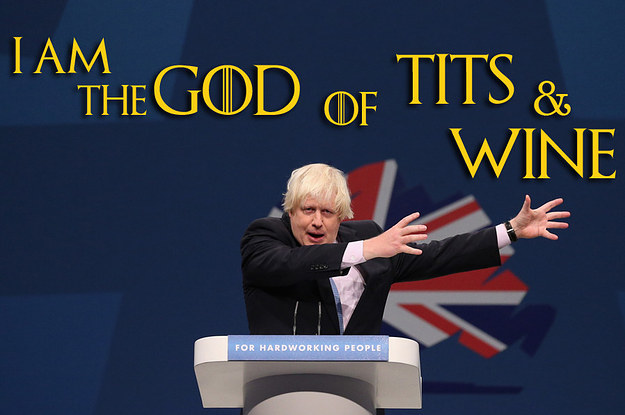
"But if we jump forward 50 years from LOTR, the world — and the popular stories that reflect that world — becomes quite different. Because on September 11, 2001, 19 terrorists hijacked four planes and managed to damage the Pentagon and destroy both towers of the World Trade Center, killing thousands of innocents.
This kind of literal and figurative leveling affected people in the U.S. most of all — America’s unspoken belief in its isolation and safety from violent world events was the first casualty. But people in every nation were stunned by the way a comparatively tiny group of people could cause such destruction, could shock the most powerful country in the world right down to its foundations. (In fact, in many ways, 9/11 could be seen as a nasty perversion of the central idea of LOTR, that the small and “insignificant” peoples of the world could rise up and shake the foundations of the mighty.)

In the aftermath of the attacks, a myth of everybody pulling together for the common good was promulgated, and in some cases was happily true. But a rise in violence and discrimination against Muslims showed that “pulling together” was not the only story....
The runaway popularity of The Walking Dead and The Hunger Games in the 2000s also signaled a different sort of sensibility from Tolkien’s postwar years. The enemies were closer, and sometimes they were even friends — or had been. Nothing was entirely trustworthy, not family, not community, and certainly not the government. The anti-establishment cynicism of the ’60s and ’70s had been replaced by a cynicism about virtually everything, and certainly about all institutions.
Priests and teachers were now seen as potential molesters...
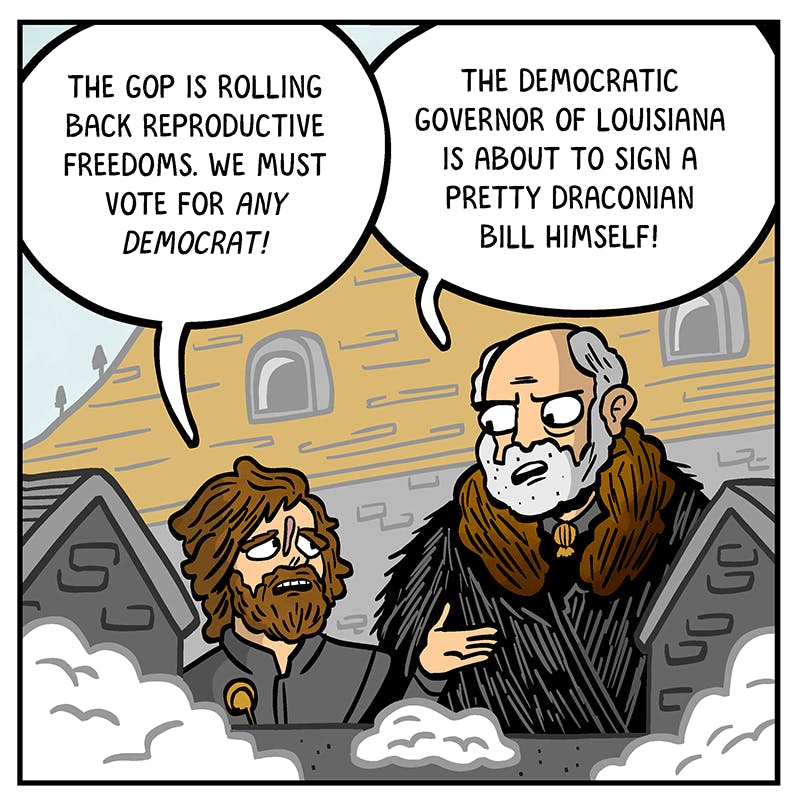
G.R.R. Martin, at least in his famous work of fiction (abetted now by the show-runners who are finishing the story for him), has made it very clear that not only is innocence or a good heart no defense, in many cases they are magnets for disaster. The strong will destroy the weak, proclaims the Westeros philosophy, and only cunning and moral flexibility matter. No one can be trusted completely, nor should be. The world is without form except for that which human agency can give it, and power is the only protection, though even that protection can turn out to be insufficient, as various assassinations in Game of Thrones have made all too clear.
Did Martin invent this worldview? No, no more than Tolkien invented the postwar milieu in which his work became so popular. But both writers spoke to the fears and hopes of their own time, and if Tolkien’s work came to us in a time with more hope than now, that is not Martin’s fault."
(Source: https://www.vulture.com/2019/04/game-of-thrones-george-r-r-martin-legacy-epic-fantasy.html)
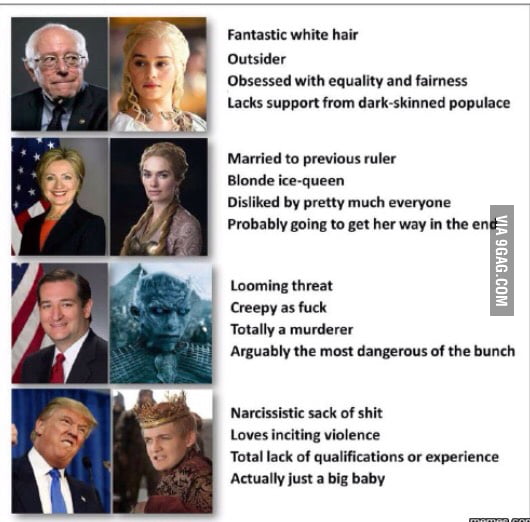
Game of Thrones reflects a dark outlook on life. Game of Thrones tends to reinforce a lot of the modern day cynicism people seem to express about their cultural institutions. It seems to me that a lot of people have lost their collective faith on stuff like politics, religion and even in the goodness of their fellow men. Game of Thrones reflects that cynicism and validates it. It speaks to people's anxieties and fears in a way that no other work seems to have done.
_____________________________________________________
Final Reason: It finally provided a meaningful alternative to Lord of the Rings
I love the fantasy genre. Whether we're talking about the books or the movies, I love Lord of the Rings. Reading the books and watching Peter Jackson's Lord of the Rings trilogy had a profound impact on me. Apparently I'm not the only one who loves The Lord of the Rings.
One unfortunate aspect of the epic fantasy genre as we know it is that no writer in the genre can escape the shadow of JRR Tolkien. Having a fantasy series be inspired by The Lord of the Rings has become a cliche in and of itself.
It almost feels like an irrevocable law of pop culture that any successful fantasy work will be compared at one point in time to The Lord of the Rings. It happened to Harry Potter. It happened to Game of Thrones. George RR Martin even admits to being influenced by Lord of the Rings, so even A Song of Ice and Fire has been influenced by Lord of the Rings.
Unfortunately nobody can out-Tolkien Tolkien. One popular consensus that I've seen from a lot of people is that a lot of fantasy often feels like a cheap knock-off of Lord of The Rings. That is, until Game of Thrones came out. Game of Thrones managed to be an epic fantasy that broke this mold. Sure, Harry Potter did this too, but you can argue that Harry Potter is almost a different genre than Lord of the Rings.

For a lot of people, it feels like George RR Martin "reinvented"* the fantasy genre. Game of Thrones is a lot of things, but Lord of the Rings knock-off isn't one of them. I've seen some people describe Game of Thrones as "fantasy for those who do not like fantasy" in a similar way to how Cowboy Bebop has been described as "anime for those who do not like anime."
* Some people have said "updated" which I strongly disagree with since Tolkien's work is timeless for the record but whatever.

Final Thoughts: So let's recap on why Game of Thrones was popular to begin with:
- The bread and butter of the books and the early seasons of the show were based on the subversion of popular fantasy tropes.
- It captured the modern zeitgeist in a profound way.
- It provided a meaningful alternative to Lord of the Rings.
As I've mentioned before bringing all of this up is super important because it also explains why the show went downhill in the later seasons. There are a lot of reasons why Game of Thrones fell from grace. The core reason, in my opinion, is that the show abandoned the core principles it was initially built on. The show forgot what made it successful in the first place. Game of Thrones in the final seasons became the very thing it sought to subvert in the first place.
The reasons that I listed for its popularity also ended up bugging me in multiple ways...because for me personally, Game of Thrones and the books that its based on, have a lot of issues underneath the surface.
No comments:
Post a Comment